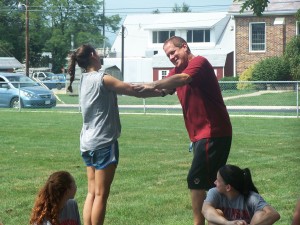One of the keys to becoming a mentally tough athlete is to play the game with a high level of 
confidence. During my years working as a #team building/mental toughness coach, the most frequent request that I receive from players is that they want to learn how to play with more confidence. I view playing with confidence as a choice that you control, but sometimes this is easier said than done. Some athletes frequently base their confidence on how they feel on a particular day or sometimes they believe that they always need to perform well in order to play with confidence. This notion is absolutely false You cannot base your mental game on your feelings at a given moment and you cannot let the way you play always dictate how you feel about yourself as a player. If this is the case you will find yourself riding an emotional roller coaster. I always tell athletes that you do not always control your feelings and that feelings can be very random. A good example is that sometimes you can wake up in the morning and feel like a total loser and you do not have a rational reason for feeling this way.
When you are no t playing well, the mentally tough player usually takes charge of his/her mental game and finds ways to short circuit these thoughts of self-doubt. However, how often do you observe yourself or one of your players yelling at themselves on the field? Things like “What am I doing!” “I can’t do anything right today!” or simply “I stink and don’t belong on the field!” In addition to the negative self-talk this player’s body language may exude frustration and self-doubt, and stress. Whether an athlete is playing well or not, this self berating will inevitably be a distraction and will keep you from playing with self-confidence. When you give the image of negativity and frustration you are giving your opponent the advantage. By understanding the power of self-talk, one can not only create a positive outlook but also help athletes focus during the most difficult times in a game. Positive self-talk is used to help motivate oneself and build self-confidence or it can be used as an instructional tool. Examples of positive self-talk would be: “Let’s go!” “I want it!” “Eye on the ball,” and “Keep moving.” Negative self-talk is the counterproductive, anxiety producing, overly critical thoughts an athlete may have. Negative self-talk often stems from unrealistic expectations and irrational thoughts. If an athlete puts herself up on a pedestal and believes she can never make a mistake, it is all too easy to knock them down. Likewise, if an athlete irrationally believes their well being is completely dependent on the outcome of a game and how they play, it is likely this pressure will lead to anxious and counterproductive thoughts.
t playing well, the mentally tough player usually takes charge of his/her mental game and finds ways to short circuit these thoughts of self-doubt. However, how often do you observe yourself or one of your players yelling at themselves on the field? Things like “What am I doing!” “I can’t do anything right today!” or simply “I stink and don’t belong on the field!” In addition to the negative self-talk this player’s body language may exude frustration and self-doubt, and stress. Whether an athlete is playing well or not, this self berating will inevitably be a distraction and will keep you from playing with self-confidence. When you give the image of negativity and frustration you are giving your opponent the advantage. By understanding the power of self-talk, one can not only create a positive outlook but also help athletes focus during the most difficult times in a game. Positive self-talk is used to help motivate oneself and build self-confidence or it can be used as an instructional tool. Examples of positive self-talk would be: “Let’s go!” “I want it!” “Eye on the ball,” and “Keep moving.” Negative self-talk is the counterproductive, anxiety producing, overly critical thoughts an athlete may have. Negative self-talk often stems from unrealistic expectations and irrational thoughts. If an athlete puts herself up on a pedestal and believes she can never make a mistake, it is all too easy to knock them down. Likewise, if an athlete irrationally believes their well being is completely dependent on the outcome of a game and how they play, it is likely this pressure will lead to anxious and counterproductive thoughts.
Don’t Say Don’t! You must Always, Always Believe in Yourself even during the times when one is not performing well. Do not underestimate the Power of Belief. During these times of self-doubt you may have to FAKE IT TO MAKE IT. Muhammad Ali said: “In order to be a great champion, you must believe that you are the best…. And if you are not, pretend that you are.”
Looking to Gain a Mental Edge? Contact Keith Waldman by email at keith@opawinningteams.com or by calling (856) 988-2939.




